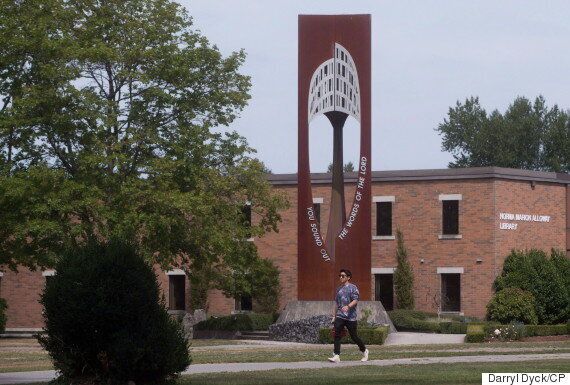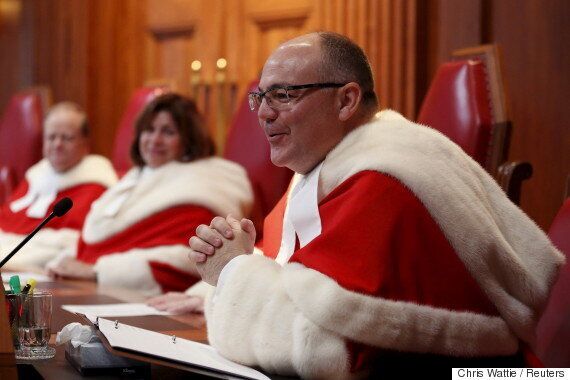Trinity Western University: Controversies and court cases
-
Trinity Western College in Langley, B.C.
[Image source. Click image to open in new window.]
The upcoming Supreme Court of Canada appeal about whether Trinity Western University has the right to establish a law school that bans gays and lesbians promises to be one of the most influential human rights decisions in the history of the court.
Trinity Western's "community covenant" requires students to sign a pledge to abstain from any sexual activity outside of heterosexual marriage, thereby prohibiting gays and lesbians from attending the school unless they repress or deny their identity. The fact that the legality of a ban on gays and lesbians is still a subject of debate is a depressing reminder of how reviled LGBTQ+ people still are among certain segments of society.
Anyone who doubts this ought to consider whether a white supremacist, "Christian identity" law school would be permitted to ban African-Canadians or Indo-Canadians, or to prohibit "African" or "Indian" behaviour. There is no constitutional, moral or legal difference between this far-fetched, hypothetical racist school and the prospective, overtly homophobic and very real university in this scenario.
Modern hatred of LGBT people is often reflected in the refusal to recognize sexuality as a fundamental part of their identity, as well as the cowardly tendency to hide this animosity behind a façade of religious devotion. The fact that TWU's exercise of "religious freedom" ignores other practices forbidden in the Bible, like wearing blended clothing, eating or touching pigs (no football allowed), allowing women to speak in church or the capital offence of breaking the Sabbath, as well as dozens of other prohibitions, is proof that homophobia, and not piety, is the motivation for Trinity Western's policy. The widespread homophobia described by LGBT former TWU students demonstrates the effect of the policy on vulnerable minority groups.
Trinity Western's right to practice its religion is not being challenged. They remain free to operate their university, as they have for decades. Instead, Trinity Western seeks to challenge the right of law societies across the country to require that law schools meet basic human rights standards before granting them accreditation. It is on this point where Trinity Western's case falls apart.
As well as the "community covenant," all teachers at TWU must sign a "statement of faith" in which they declare that hell is real and that it consists of "condemnation and conscious eternal punishment" for non-Christians. The Canadian Charter of Rights and Freedoms, in which equality rights are sacrosanct, is the supreme law of the land. How on earth can a law school teach that all citizens are equal while simultaneously declaring that millions of said citizens are so contemptible that they deserve unending suffering?
Such a declaration is also inimical to the academic freedom required at a law school. People are free to hold whatever bizarre or hateful beliefs they choose; they are not permitted to demand these beliefs be accepted by professional certification organizations. For example, young-earth creationists are welcome to believe the earth was created in six days and humans walked with dinosaurs, but they cannot insist on being certified as accredited evolutionary biologists. Similarly, TWU is free to teach that lesbians and gays are sinful, but they have absolutely no right to demand law societies abandon their commitment to LGBT equality and the Charter of Rights.
Though this case seems drawn from a previous century, there is nevertheless reason for LGBT advocates to be concerned. Stephen Harper's last pick to the Supreme Court of Canada, Justice Russell Brown, sat on the Advisory Council of the Justice Centre for Constitutional Freedoms (JCCF), which is one of the intervenors in the TWU case, as well as the Canadian Constitution Foundation, another group which has lobbied publicly on TWU's behalf.
-
Regarding the Canadian Constitution Foundation and Canadian Supreme Court Justice Russell Brown, see also: [2019-09-10] Libertarian student group Runnymede Society seeks to shake up Canada's legal culture.
The Canadian Constitution Foundation is well-connected in political and legal circles: Its former executive director Howard Anglin was a senior adviser to Stephen Harper, and is now principal secretary to Alberta Premier Jason Kenney of the United Conservative Party.
Supreme Court Justice Russell Brown, a Harper appointee, is a former member of the Board of Directors of the Canadian Constitution Foundation.
Most JCCF cases involve advocating on behalf of pro-life protesters, people (including one of the most influential and notorious Islamophobes in the United States) who denigrate Islam; organizations and individuals whose religious beliefs "compel" them to discriminate against LGBT people; and Christians who wish to proselytize publicly. The JCCF has acted as an intervenor in the TWU case, and, though he resigned his position upon his ascension to the bench, Brown's volunteer advocacy on behalf of (and membership in) an organization so hostile to gay and lesbian equality ought to worry LGBT people whose rights are at stake at the Supreme Court in the TWU case.
Brown served on the JCCF Advisory Council alongside another lawyer who represented the Seventh Day Adventist Church in the TWU case, and a current JCCF lawyer, who was on the board of directors concurrently. Shockingly, Justice Brown's endorsement of the JCCF, its mission, and John Carpay, its leader, "mistakenly" remained on the website until July 2015, while he was a sitting judge in Alberta and while the TWU case was being litigated in Ontario and B.C.
-
Justice Russell Brown speaks during his welcoming ceremony at the Supreme Court of Canada in Ottawa Oct. 6, 2015.
[Image source. Click image to open in new window.]
While Brown's integrity is not in question, his previous political affiliation with so many individuals involved in litigating the TWU case is evidence of a conflict of interest. He also served on the advisory board of the Canadian Constitution Foundation, another hard-right organization which has published articles supporting TWU's LGBT ban. He served on the council with John Carpay, who is also the current leader of the JCCF.
While a law professor and blogger, Brown questioned the impartiality of Chief Justice Beverley McLachlin, suggesting she had a bias in favour of the Liberal Party. Though there was no direct evidence to support his suggestion, there was arguably an appearance of bias, in that McLachlin appeared to caution the Conservatives more than the Liberals, about possible judicial appointments. The appearance of bias is much more striking in this case. Canadians should hope Brown's admirable ability to recognize the potential for bias has survived his elevation to the Supreme Court. If not, his involvement in a case where his conflict is so obvious, risks damaging his credibility and that of the court on which he serves.
Return to Persagen.com

